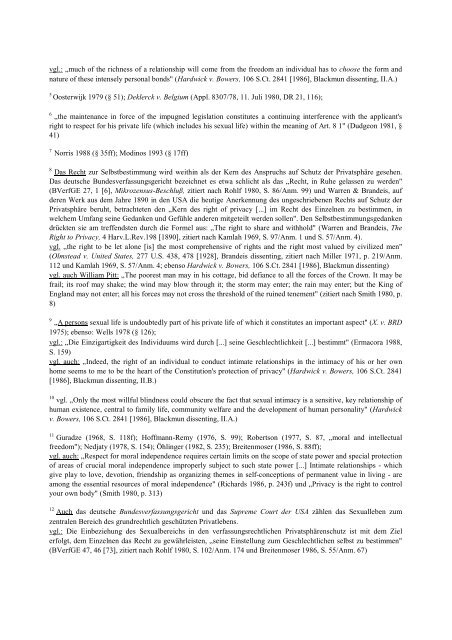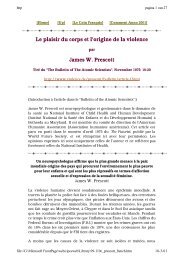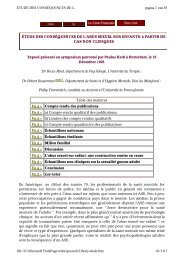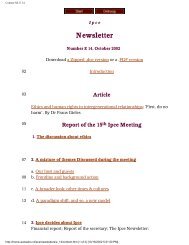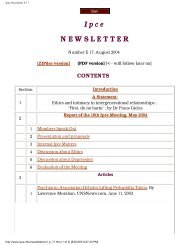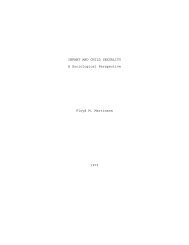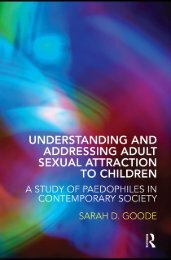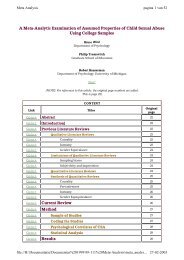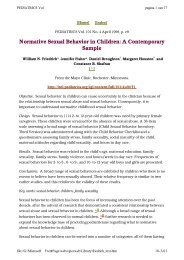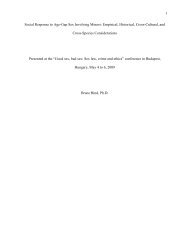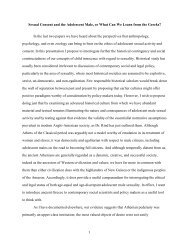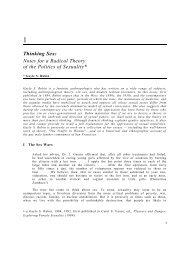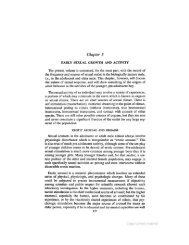Kapitel 2 - Ipce
Kapitel 2 - Ipce
Kapitel 2 - Ipce
Sie wollen auch ein ePaper? Erhöhen Sie die Reichweite Ihrer Titel.
YUMPU macht aus Druck-PDFs automatisch weboptimierte ePaper, die Google liebt.
vgl.: „much of the richness of a relationship will come from the freedom an individual has to choose the form and<br />
nature of these intensely personal bonds" (Hardwick v. Bowers, 106 S.Ct. 2841 [1986], Blackmun dissenting, II.A.)<br />
5<br />
Oosterwijk 1979 (§ 51); Deklerck v. Belgium (Appl. 8307/78, 11. Juli 1980, DR 21, 116);<br />
6<br />
„the maintenance in force of the impugned legislation constitutes a continuing interference with the applicant's<br />
right to respect for his private life (which includes his sexual life) within the meaning of Art. 8 1" (Dudgeon 1981, §<br />
41)<br />
7<br />
Norris 1988 (§ 35ff); Modinos 1993 (§ 17ff)<br />
8<br />
Das Recht zur Selbstbestimmung wird weithin als der Kern des Anspruchs auf Schutz der Privatsphäre gesehen.<br />
Das deutsche Bundesverfassungsgericht bezeichnet es etwa schlicht als das „Recht, in Ruhe gelassen zu werden"<br />
(BVerfGE 27, 1 [6], Mikrozensus-Beschluß, zitiert nach Rohlf 1980, S. 86/Anm. 99) und Warren & Brandeis, auf<br />
deren Werk aus dem Jahre 1890 in den USA die heutige Anerkennung des ungeschriebenen Rechts auf Schutz der<br />
Privatsphäre beruht, betrachteten den „Kern des right of privacy [...] im Recht des Einzelnen zu bestimmen, in<br />
welchem Umfang seine Gedanken und Gefühle anderen mitgeteilt werden sollen". Den Selbstbestimmungsgedanken<br />
drückten sie am treffendsten durch die Formel aus: „The right to share and withhold" (Warren and Brandeis, The<br />
Right to Privacy, 4 Harv.L.Rev.198 [1890], zitiert nach Kamlah 1969, S. 97/Anm. 1 und S. 57/Anm. 4).<br />
vgl. „the right to be let alone [is] the most comprehensive of rights and the right most valued by civilized men"<br />
(Olmstead v. United States, 277 U.S. 438, 478 [1928], Brandeis dissenting, zitiert nach Miller 1971, p. 219/Anm.<br />
112 und Kamlah 1969, S. 57/Anm. 4; ebenso Hardwick v. Bowers, 106 S.Ct. 2841 [1986], Blackmun dissenting)<br />
vgl. auch William Pitt: „The poorest man may in his cottage, bid defiance to all the forces of the Crown. It may be<br />
frail; its roof may shake; the wind may blow through it; the storm may enter; the rain may enter; but the King of<br />
England may not enter; all his forces may not cross the threshold of the ruined tenement" (zitiert nach Smith 1980, p.<br />
8)<br />
9<br />
„A persons sexual life is undoubtedly part of his private life of which it constitutes an important aspect" (X. v. BRD<br />
1975); ebenso: Wells 1978 (§ 126);<br />
vgl.: „Die Einzigartigkeit des Individuums wird durch [...] seine Geschlechtlichkeit [...] bestimmt" (Ermacora 1988,<br />
S. 159)<br />
vgl. auch: „Indeed, the right of an individual to conduct intimate relationships in the intimacy of his or her own<br />
home seems to me to be the heart of the Constitution's protection of privacy" (Hardwick v. Bowers, 106 S.Ct. 2841<br />
[1986], Blackmun dissenting, II.B.)<br />
10<br />
vgl. „Only the most willful blindness could obscure the fact that sexual intimacy is a sensitive, key relationship of<br />
human existence, central to family life, community welfare and the development of human personality" (Hardwick<br />
v. Bowers, 106 S.Ct. 2841 [1986], Blackmun dissenting, II.A.)<br />
11<br />
Guradze (1968, S. 118f); Hoffmann-Remy (1976, S. 99); Robertson (1977, S. 87, „moral and intellectual<br />
freedom"); Nedjaty (1978, S. 154); Öhlinger (1982, S. 235); Breitenmoser (1986, S. 88ff);<br />
vgl. auch: „Respect for moral independence requires certain limits on the scope of state power and special protection<br />
of areas of crucial moral independence improperly subject to such state power [...] Intimate relationships - which<br />
give play to love, devotion, friendship as organizing themes in self-conceptions of permanent value in living - are<br />
among the essential resources of moral independence" (Richards 1986, p. 243f) und „Privacy is the right to control<br />
your own body" (Smith 1980, p. 313)<br />
12<br />
Auch das deutsche Bundesverfassungsgericht und das Supreme Court der USA zählen das Sexualleben zum<br />
zentralen Bereich des grundrechtlich geschützten Privatlebens.<br />
vgl.: Die Einbeziehung des Sexualbereichs in den verfassungsrechtlichen Privatsphärenschutz ist mit dem Ziel<br />
erfolgt, dem Einzelnen das Recht zu gewährleisten, „seine Einstellung zum Geschlechtlichen selbst zu bestimmen"<br />
(BVerfGE 47, 46 [73], zitiert nach Rohlf 1980, S. 102/Anm. 174 und Breitenmoser 1986, S. 55/Anm. 67)


